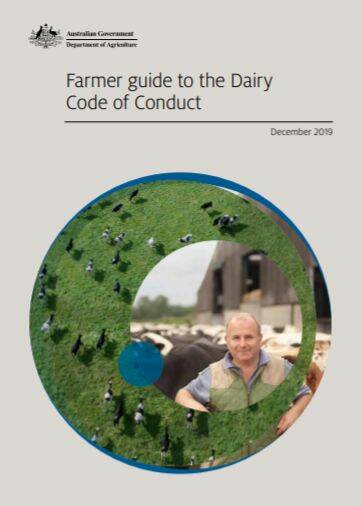
In what looks to be a win for farmer groups, the mandatory Dairy Code of Conduct has just been released this morning and will be in place on New Year's Day.
Subscribe now for unlimited access to all our agricultural news
across the nation
or signup to continue reading
It addresses the major sticking point that emerged from the draft - the ability of processors to unilaterally change the price and conditions of their contracts with farmers.
Processors can only unilaterally vary milk supply agreements in two circumstances:
The first is a a change in law with which the processor or farmer must comply and, even then, those variations can only reflect the legal changes and cannot result in a decrease of minimum price in an agreement.
In the second case, a processor may be permitted to step-down the price in an "exceptional circumstance".
When that happens, the processor must advise the ACCC of its intention, provide farmers 30 days' notice and give farmers permission to terminate the agreement.
Examples of exceptional circumstances include the sudden closure of an export market or a biosecurity emergency.
It does not prevent farmers and processors agreeing to vary the contract, provided the variations comply with the code and other laws.
Dairy Connect chief executive Shaughn Morgan said he was very pleased with the outcome.
"It's a great outcome for us," Mr Morgan said.
"Unilateral variations are outlawed, except in two circumstances.
"One is if there's another global financial crisis or if there's legislative change, which is exactly what we asked for.
"If the processors want a step down in exceptional circumstances, it has to be looked at by the ACCC, so there's a safeguard in place.
"The ACCC will be the arbiter and, if they don't believe the step-down is justified, they can then refer it on for further review.
"Penalty units have changed, so there are 100 penalty units for farmers and 300 for processors.
"Everything we asked for, they've given us.
"The document is great and Bridget McKenzie is smiling from ear to ear."
Striking agreement
From 1 January 2020, all new agreements must comply with the code, while agreements already in place have 12 months to become code-compliant.
Processors need to publish standard forms of agreement annually by June 1 on their websites.
All standard forms of agreement must contain minimum prices, justification of prices and a cooling-off period of 14 days.
All processors need to offer non-exclusive supply agreements but can offer an exclusive agreement with terms similar to the non-exclusive agreement.
The prices for exclusive and non-exclusive milk supply do not have to be the same.
Contract inclusions
Contracts must include a clear minimum price, a schedule of monthly prices, or a schedule of yearly prices for longer-term agreements (and the price among years can be different).
There must be a a clear start and end date for the milk supply period, unless the processor is a cooperative.
Quantities only need to be included if applicable but quality requirements of milk, including sampling procedures and assurances about volume accuracy need to detail when the processor may reject milk supplied by the farmer and what will be done with the milk.
When longer than three years, an agreement must allow farmers to postpone its end by 12 months so those who wish to exit the industry to resolve their business, sell assets and address any animal welfare and environmental concerns.
MORE TO COME


